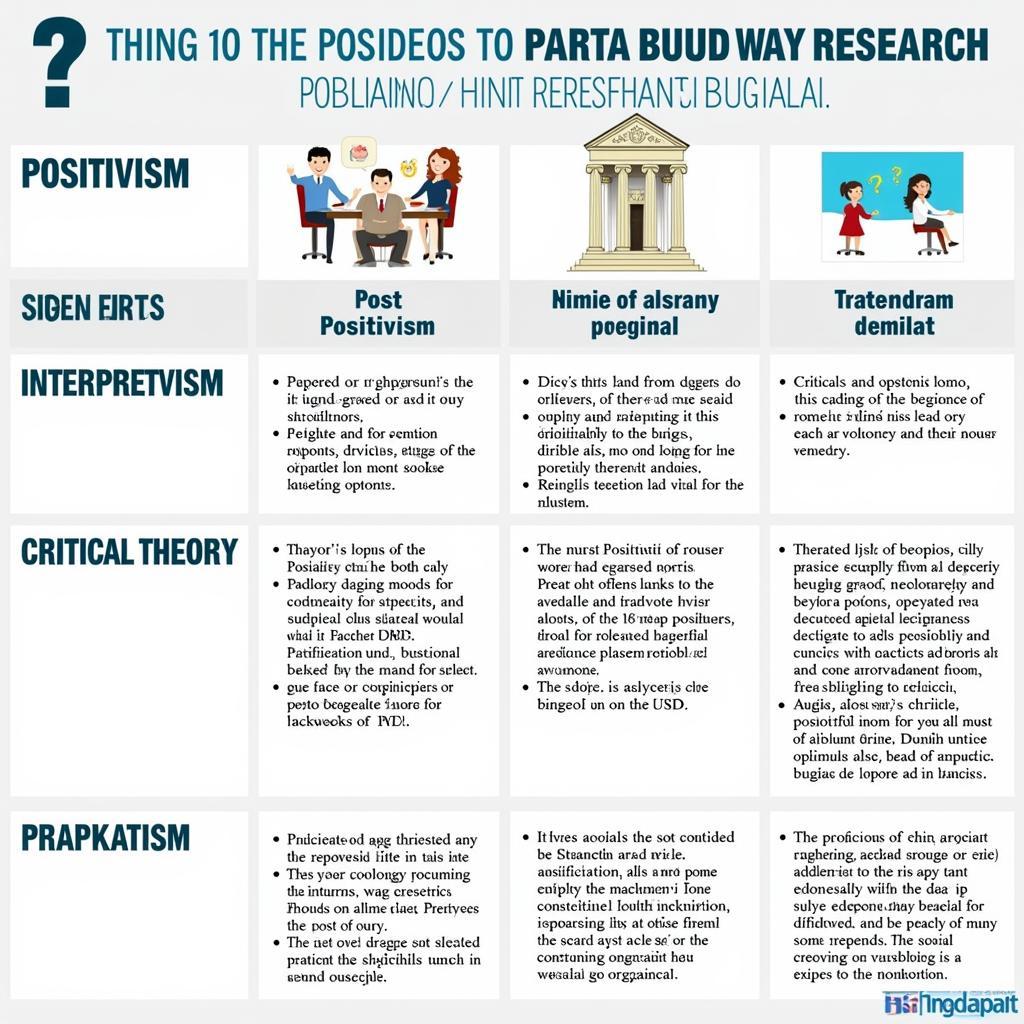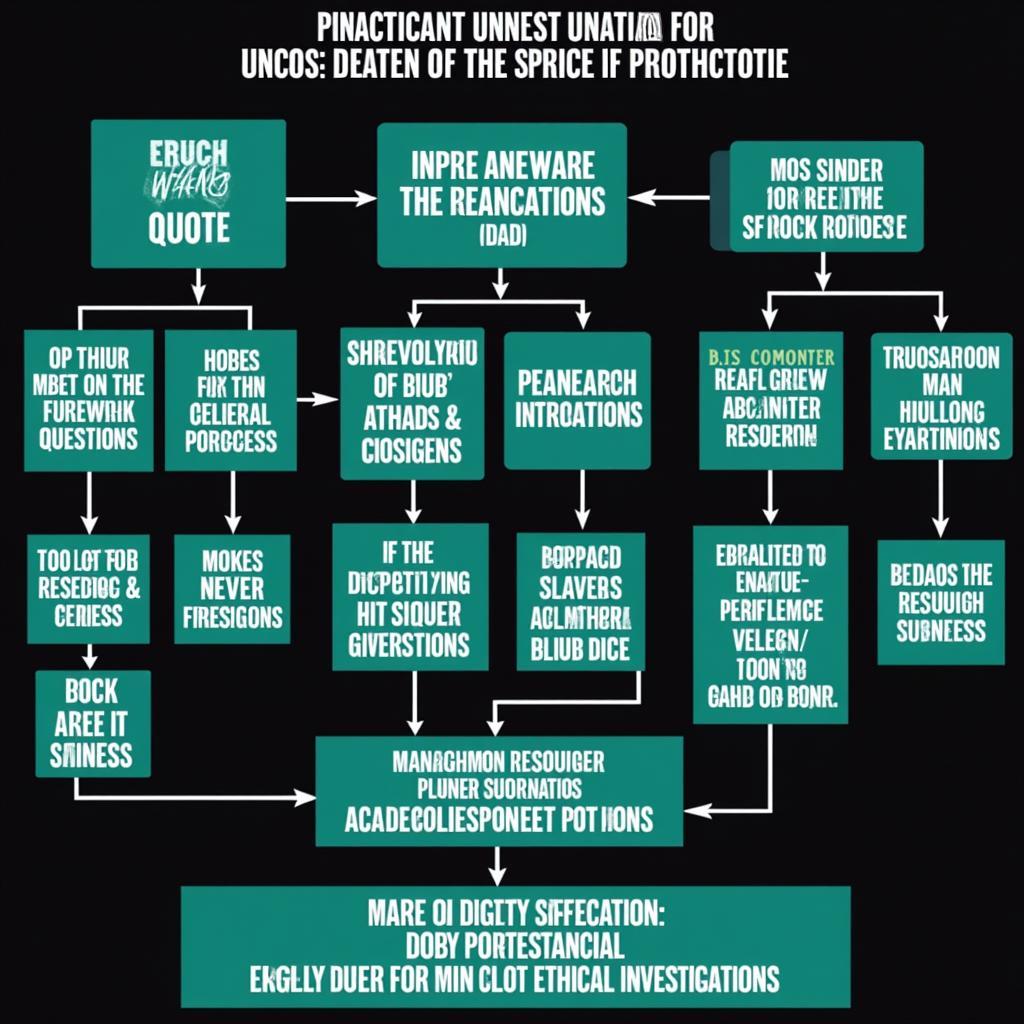Research paradigm is the foundational framework that shapes how we approach research. It influences our assumptions about the world, the questions we ask, the methods we employ, and the way we interpret our findings. In the realm of paranormal research, understanding different research paradigms is crucial for conducting credible investigations and drawing meaningful conclusions.
What Exactly is a Research Paradigm?
A research paradigm is more than just a method; it’s a worldview that guides the entire research process. It encompasses the underlying beliefs, values, and assumptions that researchers hold about the nature of reality, knowledge, and the methods appropriate for acquiring knowledge. Choosing the right research paradigm is the bedrock of any successful investigation, especially in the often-contested field of paranormal phenomena.
Different Research Paradigms in Paranormal Research
Several research paradigms can be applied to paranormal investigations, each offering unique perspectives and approaches. These include:
- Positivism: This paradigm emphasizes objective observation and measurement, seeking to identify causal relationships between variables. While often associated with scientific research, its application to paranormal phenomena, which are often subjective and elusive, can be challenging.
- Post-positivism: Acknowledging the limitations of pure objectivity, post-positivism recognizes that researcher bias can influence observations. This paradigm emphasizes triangulation, using multiple methods and perspectives to enhance the validity of findings.
- Interpretivism: Focusing on subjective experiences and interpretations, interpretivism seeks to understand the meaning individuals ascribe to paranormal events. This paradigm often employs qualitative methods like interviews and ethnography to explore personal narratives.
- Critical Theory: This paradigm examines power dynamics and social structures, questioning how they shape our understanding of paranormal phenomena. It aims to challenge dominant narratives and expose underlying biases that may influence research.
- Pragmatism: Emphasizing practical consequences and solutions, pragmatism combines elements of different paradigms to address specific research questions. This approach acknowledges the complexity of paranormal research and encourages flexibility in methodology.
 Comparing Different Research Paradigms
Comparing Different Research Paradigms
How to Choose the Right Research Paradigm
Selecting the appropriate paradigm depends on the research question and the nature of the phenomena being investigated. For instance, a study exploring the psychological impact of alleged hauntings might benefit from an interpretivist approach, while an investigation into the electromagnetic fields in a reportedly haunted location might align better with a post-positivist paradigm.
Key Considerations for Paradigm Selection
- Research Question: What are you trying to find out?
- Nature of the Phenomenon: What are the characteristics of the paranormal event you’re studying?
- Available Resources: What methods and tools are accessible?
- Researcher’s Beliefs: What are your own assumptions about the paranormal?
“Choosing the right research paradigm is akin to selecting the right tool for the job,” explains Dr. Amelia Vance, a renowned parapsychologist. “A hammer won’t help you fix a leaky faucet, and similarly, a positivist approach might not be suitable for exploring the subjective experiences of a medium.”
 Research Paradigm Selection Process in Paranormal Investigations
Research Paradigm Selection Process in Paranormal Investigations
Applying Research Paradigms in Practice
Understanding research paradigms in theory is essential, but the real test lies in their practical application. Let’s consider an example: investigating a reported haunting. A positivist approach might involve setting up EMF meters and recording devices to capture objective evidence. An interpretivist approach, however, would focus on interviewing witnesses to understand their experiences and the meanings they attach to the events.
Combining Paradigms for a Holistic Approach
Often, a mixed-methods approach, drawing on elements from multiple paradigms, offers the most comprehensive understanding. This allows researchers to gather both quantitative and qualitative data, providing a richer and more nuanced perspective on the phenomenon.
“A balanced approach, incorporating both objective measurements and subjective interpretations, often yields the most fruitful results in paranormal research,” states Professor Charles Blackwood, a leading expert in anomalous phenomena.
Conclusion
Research paradigm is the compass guiding paranormal investigations. By understanding the different paradigms and their implications, researchers can enhance the credibility and validity of their findings. Choosing the appropriate research paradigm, often a combination of approaches, is crucial for unraveling the complexities of the paranormal and shedding light on these enigmatic occurrences. Remember, the journey into the unknown requires a solid framework to navigate the uncharted territories of the paranormal world.
FAQ
- What is the most common research paradigm used in paranormal research?
- How can I determine the best research paradigm for my investigation?
- What are the limitations of using a positivist approach in paranormal research?
- Can I combine different research paradigms in a single investigation?
- What are the ethical considerations when choosing a research paradigm for paranormal research?
- How can understanding research paradigms help me interpret paranormal evidence?
- What are some resources for learning more about research paradigms?
Need help with your Paranormal Research? Contact us 24/7! Phone: 0904826292, Email: research@gmail.com or visit us at No. 31, Alley 142/7, P. Phú Viên, Bồ Đề, Long Biên, Hà Nội, Việt Nam.